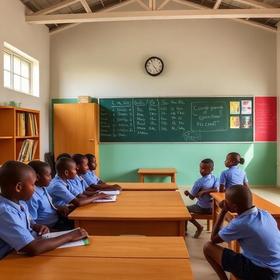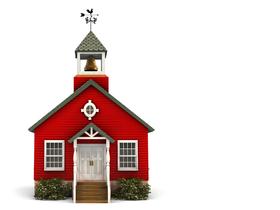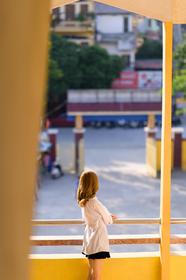Are you thinking about sending your child off to private school? Then, you must decide which educational philosophy and approach works best for you. What it comes down to is whether you want to send your child to a school that uses a traditional approach to teaching or one that uses a non-traditional approach.
In the public school world, a traditional school is a regular public school, and a non-traditional school is a charter school. That's not what I am discussing here concerning private schools. The concept of a private school as a mainly independent self-financing corporate entity does not change. You and I will focus on what is taught in the classroom and how it is prepared.
The early years
Your child's age is a significant factor in choosing an educational approach. For example, if you send him to a Montessori school as a toddler, you expose him to a non-traditional approach to education. It is an excellent approach and is highly regarded. But non-traditional nonetheless. Start your child off in a Montessori, Waldorf, or Reggio Emilia school, and you will lay a solid foundation for learning in later life. But visit a traditional private primary school, and you will see a quite different approach to early education.
The apparent difference will be the dress code. Uniforms are required at many traditional religious schools. The curricula follow traditional blocks of science, math, language arts, and social studies. Add religion if the school is a faith-based private school. Class sizes will likely be small (10-15) in a typical non-traditional school.
The fundamental differences take place in the classroom and in the way the teachers teach. Please understand that I am not being judgmental here. I'm merely highlighting differences so you can be informed and make your school decisions accordingly. The non-traditional approaches claim to allow children more flexibility to work independently and at their own pace. The traditional system believes that everybody should be engaged in the same activity simultaneously.
Classes in a traditional school progress from one teacher to another as they advance through the grade levels. Ms. Smith teaches Kindergarten. Ms. Jones is the 1st-grade teacher, and so on. In a non-traditional school, your child will probably have the same teacher for two or three years.
What about educational outcomes? That depends to a large extent on you. Your partnership with the school is critical whether the school is traditional or non-traditional. You have the responsibility to fill in the missing bits. You need to put ideas and concepts into context so your child understands them and learns how to apply them in everyday life. Children learn in different ways. You know how your child learns better than anyone. That's why you are such an essential partner in his education.
The high school years
So, what happens if your child attends a non-traditional high school? You know, one that does not believe in SAT preparation or Advanced Placement courses, among other traditional college prep academic staples. What if he has spent his primary school years in a progressive school "where he has had to construct his own understanding of ideas and concepts," as Alfie Kohn so succinctly puts it? Do you want your child to learn or to be taught?
Here's a look into Ananda Living Wisdom School in Nevada City, California.
Your child will do just fine with college admissions provided that you and he pay attention to the basics - does he offer what the college is looking for - and the details - applications turned in on time and complete. The savvy parent will hire an educational consultant to identify colleges with the best fit for her child. Princeton is a marvelous institution. But it might not necessarily be the best fit for your child. Since you are already thinking outside the box concerning your child's primary and secondary education, it makes sense to continue thinking outside the package as you look at colleges.
Don't traditional schools do a better job of the college prep essentials such as SATs and AP courses? Some do. Some don't. Much depends on the competence and experience of the teachers. Don't traditional schools serve as feeder schools to the best universities and colleges? Decades ago, that may have been the case. But in the 21st century, diversity rules in the college admissions office just as in private school admissions offices. Admissions officers look for characteristics and experiences that make an applicant stand out and be able to contribute something meaningful to the makeup of their freshman classes.
Carmelita Hilton, the founder of The Putney School, Putney, Vermont, articulated some basic principles she called Fundamental Beliefs. I quote them here verbatim and in their entirety because they clearly express what progressive education is and how it works.
"Fundamental Beliefs"
"The school's philosophy initiated in 1935 and distilled into eight fundamental beliefs by Putney's founder, progressive educator Carmelita Hinton, reads as follows:
- To work not for marks, badges, and honors but to discover the truth and to grow in the knowledge of the universe and the understanding of men, to treasure the hard stretching of oneself, to render service.
- To learn to appreciate and participate in the creative arts where the man expresses his struggle to communicate his inner life and beauty and to grant these arts great prestige.
- To believe in manual labor, be glad to do one's share of it, and be proud of the skills learned.
- To play just as wholeheartedly as one works, but watching out a bit for the competitive angle, remembering that play is for recreation and increased joy in living.
- To want to lend a hand to the community at large, not to live in an "ivory tower."
- To combat prejudices caused by differences in economic, political, racial, and religious backgrounds; to strive for a world outlook, putting oneself in others' places, no matter how far away or remote.
- To have old and young work together in a true comradeship relation, stressing the community and its need for the cooperation of all.
- To wish to live adventurously though not recklessly, willing to take risks, if need be, for moral growth, so that one progresses along the long slow road toward achieving a civilization worthy of the name."
- Carmelita Hinton, 1954
Ann Marie White, Academic Dean at The Putney School, answers the question, "What is progressive education?"
Lots to think about, for sure. Visit both traditional and non-traditional schools. Ask questions. Compare schools. Then, decide which approach works best for your child and you.
Questions? Contact us on Facebook. @privateschoolreview
More Reading













